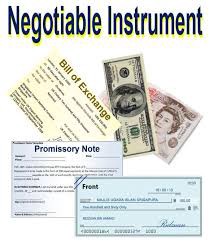
From Simmons v. London Joint Stock Bank [1]; the House of Lords overturned the lower court on appeal to set the definition of a negotiable instrument. This form of security is one, the property in which is acquired by any one who takes it “bona fide” and for value. This is perfected notwithstanding any defect of title in the person from whom the receiver took the instrument.
From this, it follows that an instrument cannot be deemed negotiable otherwise. Further, it is necessary that the true owner can transfer the contract or engagement encompassed by the simple delivery of the instrument.
Bona Fide: Genuine, Real
Without intention to deceive
With good faith
For Value: This indicates that a transaction exists, and
that the drawer of the bill has received good or money from its drawee.
some consideration (money or other value) has been given in exchange (as per the contract terms)
Lord Mansfield in Miller v. Race [2] held that money “cannot be recovered after it has passed in currency”. Not from the thief, but the Bona Fide taker for value from the thief.
What I shall explain here is that Bitcoin is a negotiable instrument. It is perfected when passed from one party on-chain to another. Unfortunately, Bitcoin is not always a negotiable instrument and does not always have the protections under law that such a form of security maintains.
One counter to negotiability, on the Bitcoin Core chain is Lightning. Here, a transfer is more like a cheque and is only perfected later. Delivery would be deemed to occur only when the channel closes. And, until this point, the payment remains at risk.
Gift
The use of a transfer “for value” is an important distinction. A gift is not held to be for value. This is important as the status of a negotiable instrument imparts many benefits. For one, the state can force recovery.
Bitcoin and Keys
A flaw int the “Code is Law” fallacy is that cryptographic keys do not stop a court assigning an asset. You can destroy a key, but this merely stops all access to the key, not the courts ability to enforce payment. A court can also hold a party in Contempt for not delivering value (leading to an indefinite period of incarceration without trial). More, intentional destruction of the keys could be deemed a crime.
More, a court can liquidate other assets. A Token tied to share equity can be re-assigned no matter the state on a blockchain. If a court orders a payment, the fact that you refuse top pay leads to a few possible conditions:
· You are held in contempt until you pay
· You have your assets seized against your will
· The court assigns the ownership of the property to another and the system is updated
· You go away and live as a fugitive
Bitcoin when transferred as a negotiable instrument cannot be recovered.
If, Alice has received stolen Bitcoin and the law located her, and they find she has sold the Bitcoin to Bob for a holiday that cannot be recovered (Alice had a good time), then Bob is safe if he was unaware of the nature of the Bitcoin being illegally obtained.
Lightning is not a negotiable instrument. If Bob has a balance, then the state can have these funds forcibly recovered. Alice paying Bob on-chain is a perfected exchange. A lightning exchange is a promissory note. The distinction is one of real world consequences.
Bob who has received Bitcoin for value now has good title. No matter what, his bitcoin are his. The state cannot touch them or force a repayment.
If Bob had used Lightning, the defect in the scenario presented is that the delivery remains incomplete. The state has a legal right to take your assets if you will not return the Bitcoin (or cannot for that matter). An innocent merchant, who used the Bitcoin from Alice or other funds, but who has this as a Lightning (Promissory note) debt can be required to return the amounts.
This is why the status of a negotiable instrument is so important.

In Lightning, if you will not hand your Bitcoin keys over, they could sell your car, your house, any asset they (the state) can get a hold of. This is not the same as cash. As a merchant, what you have received as cash remains yours (if for value and Bona Fide), what you have as a Visa payment, well that is yours eventually (and maybe as it can be taken back).
Owning your keys alone does not make you safe, it does not mean you are outside the real world. If you want to trade and keep what you earn, then using Bitcoin on-Chain is safe. Lightning comes with risk.

I shall continue on this topic later. As I said, Bitcoin is an economic system. It works as it is not some Code is Law fairy’s tail.
Cases
[1] Simmons v. London Joint Stock Bank, House of Lords, L.R. (1891), 1 Ch. 270; App, Cases (1892), p201.
[2] 2 Green Bag 151 (1890) Miller v. Race (1 Smith’s Leading Cases, 9th ed. 491)

